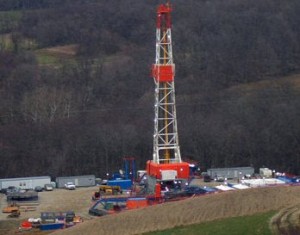Upcoming Marcellus Shale Webinar
Water management for Marcellus Shale gas production next topic in Web series
 UNIVERSITY PARK – Billions of dollars already have been invested by natural-gas companies in Pennsylvania for Marcellus Shale gas exploration. Similarly, millions of gallons of water have been utilized to develop billions of cubic feet of natural gas.
UNIVERSITY PARK – Billions of dollars already have been invested by natural-gas companies in Pennsylvania for Marcellus Shale gas exploration. Similarly, millions of gallons of water have been utilized to develop billions of cubic feet of natural gas.
The natural-gas industry is pursuing ways to minimize potential environmental impacts during development of the rich Marcellus formation, such as by treating and reusing water produced during the process. However, according to one Penn State expert, as the Marcellus natural-gas play grows, the demand for water for hydraulic fracturing will directly increase, as will the need for infrastructure to treat flowback water for reuse or disposal.
“In order to minimize the environmental and financial costs of flowback treatment, many operators are now reusing flowback and other impaired waters such as acid mine drainage,” said David Yoxtheimer, hydrogeologist and extension associate with Penn State’s Marcellus Center for Outreach and Research.
Yoxtheimer will be one of the featured speakers during a free Web-based seminar titled, “Water Use and Water Reuse/Recycling in Marcellus Shale Gas Exploration and Production,” which will air Thursday, Oct. 21, at 1 p.m. Sponsored by Penn State Cooperative Extension, the “webinar” will provide an overview of new strategies to conserve fresh water and reuse waters affected by the gas exploration process.
Information about how to register for the webinar is available at http://extension.psu.edu/naturalgas/webinars. Online participants will have the opportunity to ask the speakers questions during the session.
When shale gas drillers develop natural gas using the hydraulic-fracturing technique, they inject about 3 million to 5 million gallons of water, along with sand and a relatively low concentration of additives into the Marcellus formation to release the natural gas. According to the Susquehanna River Basin Commission, about 10 percent (300,000 to 500,000 gallons) of the injected hydraulic-fracturing fluids return to the surface via the natural-gas well within about one month.
This wastewater, known as “flowback,” contains relatively high concentrations of salt as well as some metals that were dissolved out of the shale during the fracturing process. The flowback water requires treatment prior to release back into the environment, but many companies are now reusing the flowback for subsequent hydraulic-fracturing operations, which has environmental benefits and reduces truck traffic on roads.
“Simply reusing the water is only the first step, but the lack of processing back to the water-quality standards is a big challenge to conventional thinking,” said Tony Gaudlip of Range Resources. Gaudlip, who is a co-presenter in the webinar, joined Range Resources in January 2008 following various industry positions in south Texas, Wyoming, the Middle East, Europe and Asia. “We do not need crystal clear water to use as a base fluid for fracturing,” he said.
“We do not need to treat the water at all in order to get good production — no distillation, crystallization, reverse osmosis, nanofiltration, etc. That’s all unnecessary to meet new downhole requirements,” Gaudlip said.
“What Range is doing is different,” Yoxtheimer said. “They’re fairly progressive and basically are recycling 100 percent of their water, and other companies are now following that trend.”
Yoxtheimer added that reusing flowback — and using impaired waters such as acid mine drainage and effluent from municipal or industrial wastewater plants — greatly offsets the need to use fresh water drawn from local streams and rivers.
Yoxtheimer said that Marcellus development is “proceeding pretty much full steam ahead” in Pennsylvania despite some opposition. “There are a lot of economic opportunities there that are potentially good, but also some potential environmental consequences. Ideally, a fine balance can be struck by doing the exploration and extraction in an environmentally responsible way.”
The “Water Use and Water Reuse/Recycling in Marcellus Shale Gas Exploration and Production” program is the next webinar in an ongoing series of workshops addressing issues related to the state’s Marcellus Shale gas boom. One-hour webinars also will be held at 1 p.m. on the following dates:
–Nov. 18: “Pa. DEP Regulatory Update.” Presenters: Dana Aunkst and Scott Perry, Pennsylvania Department of Environmental Protection.
–Dec. 16: “Plumbing the Depths in Pa.: A Primer on Marcellus Shale Geology and Technology.” Presenter: Mike Arthur, Penn State Marcellus Center for Outreach and Research.
–Jan. 20, 2011: “Marcellus Shale Legislation: What Was Accomplished in the 2009-10 Session and What Issues Remain to be Addressed.” Presenter: Ross Pifer, Dickinson School of Law, Penn State.
–Feb. 16, 2011: “Dealing with Gas Tax Issues: What You Need to Know.” Presenter: Mike Jacobson, Penn State School of Forest Resources.
–Mar. 17, 2011: “Natural Gas Well Development and Emergency Response and Management.” Presenter: Craig Konkle, Lycoming County Office of Emergency Management.
Previous webinars — which covered topics such as water use and quality, gas-leasing considerations for landowners and implications for local communities — can be viewed at http://extension.psu.edu/naturalgas/webinars.
For more information, contact John Turack, extension educator in Westmoreland County, at (724) 837-1402 or by e-mail at jdt15@psu.edu.
